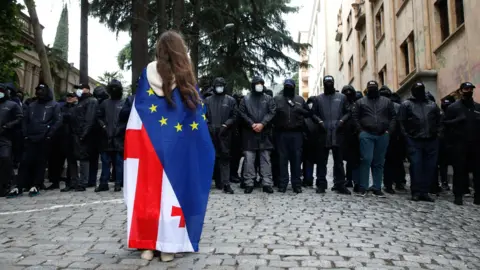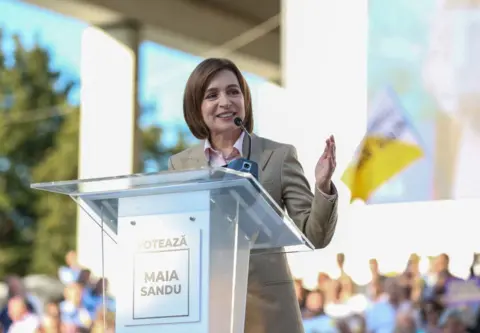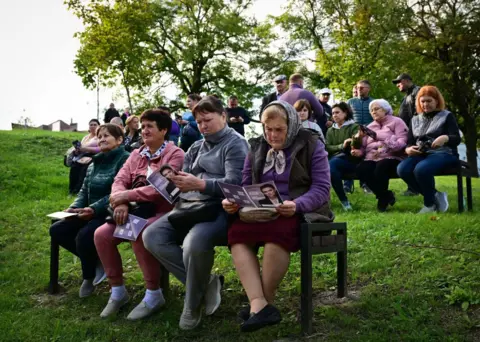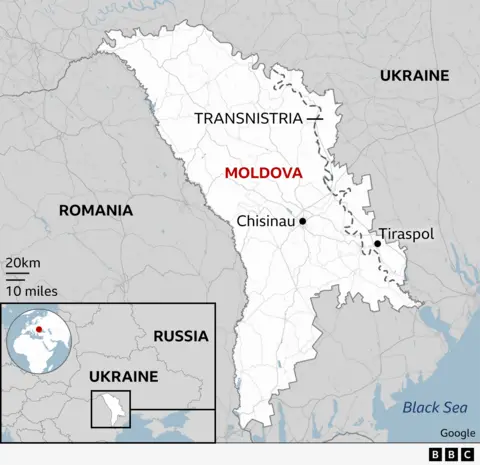 EPAAnti-government protests on the streets of Georgia's capital last spring drew thousandsTwo countries, Moldova and Georgia, are holding hold pivotal votes over the coming days that will decide their future path in Europe.
EPAAnti-government protests on the streets of Georgia's capital last spring drew thousandsTwo countries, Moldova and Georgia, are holding hold pivotal votes over the coming days that will decide their future path in Europe.
Both have felt the shadow of Russia’s war in Ukraine, and both are former Soviet republics.
While Moldova’s pro-EU president Maia Sandu is favourite to win and talks have begun on joining the European Union, the government in Georgia has been accused of “democratic backsliding” and turning away from Europe.
Moldova's twin voteMoldovans are going to the polls on Sunday in a referendum on enshrining Moldova's path to EU membership in the constitution – alongside the presidential election.
A Yes vote would consolidate Moldova's status as a pro-Western, EU-facing country. It would also mean Moldova having to set out on a long path of democratic and judicial reforms to ensure it adheres to EU standards.
A survey last month suggested more than 63% of voters would back the Yes campaign. However, many in the pro-European camp have denounced what they say are Russian efforts to spread disinformation and influence the vote.
Moldova’s population is just over 2.5 million, while 1.2 million Moldovans live abroad.
 Getty ImagesMaia Sandu has been Moldova's president since 2020Moldova’s incumbent president is Maia Sandu – the 52-year-old founder of the liberal Party of Action and Solidarity, who came to power in 2020 and is a committed pro-European.
Getty ImagesMaia Sandu has been Moldova's president since 2020Moldova’s incumbent president is Maia Sandu – the 52-year-old founder of the liberal Party of Action and Solidarity, who came to power in 2020 and is a committed pro-European.
She will face off against Alexander Stoianoglo, the former prosecutor general of Moldova who took many by surprise when he announced running for president in July.
He is supported by the pro-Russian Party of Socialists, whose leader is ex-president and popular opposition figure Igor Dodon.
Turnout on Sunday is predicted to be high – above 80%.
Recent polls suggest Sandu could win over 35% of the vote on Sunday, with Stoianoglo coming a distant second with 9%.
There are several other candidates, the majority of whom are pro-Russian. However, almost 30% of voters were still undecided, according to the polls.
If no candidate gets more than 50% of the vote, the presidential election will go to a run-off vote on 3 November.
Although Sandu should comfortably win both rounds, parliamentary elections next July look less positive for her party, which may have to work with less staunchly pro-EU forces if it wants to govern.
One figure who looms large over the election, although he is not a candidate, is Ilan Shor, a businessman and politician. His Shor Party was banned in Moldova last year following allegations of working with Russia to undermine Moldova’s security and constitutional order. Shor fled to Israel in 2019 after being convicted of fraud and money-laundering, and has recently been living in Russia.
He makes no secret of where his allegiances lie. In September, he offered money to convince “as many people as possible” to vote No or to abstain in the EU referendum.
 Getty ImagesMoldovans listen to a campaign speech in a park in Moldova's capital ChisinauPro-European forces in Moldova have long warned of Russian interference in the election and referendum vote.
Getty ImagesMoldovans listen to a campaign speech in a park in Moldova's capital ChisinauPro-European forces in Moldova have long warned of Russian interference in the election and referendum vote.
Russia still has a military base in the breakaway Moldovan region of Transnistria along Moldova's border with Ukraine, and there is also an autonomous Russian-speaking region called Gagauzia. The governor there, Eugenia Gutul, is an active supporter of Vladimir Putin and has been sanctioned by the EU for threatening Moldova's independence.
One Moldovan news website said the election campaign had been marred by Russia's "most slanderous, most violent and disruptive destabilisation campaign since the country's independence".
Authorities have linked some cases of vandalism and disinformation campaigns on social media to Shor and to his alleged Kremlin backers.
 Last month, Moldova’s chief of police Viorel Cernauteanu said 130,000 Moldovans had received money transfers from Russia – amounting to $15m – as bribes to vote for Russia-friendly candidates and against the EU referendum.
Last month, Moldova’s chief of police Viorel Cernauteanu said 130,000 Moldovans had received money transfers from Russia – amounting to $15m – as bribes to vote for Russia-friendly candidates and against the EU referendum.
On Thursday, Mr Cernauteanu alleged that dozens of Moldovans had recently travelled to Moscow, ostensibly to attend “cultural exchange programmes”, but actually receiving training to stir violence ahead of the elections.
The Kremlin maintains it "does not interfere in other people's affairs" and has accused Moldova's authorities of "denying many citizens a right to say that they support having good relations with Russia".
